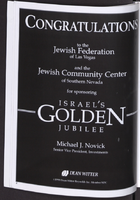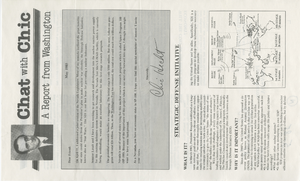Search the Special Collections and Archives Portal
Search Results
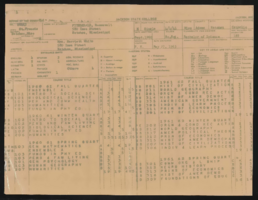
Roosevelt Fitzgerald curriculum vitae, diplomas, and college transcripts
Date
Archival Collection
Description
From the Roosevelt Fitzgerald Professional Papers (MS-01082) -- Personal and professional papers file. (Transcripts less than 75 years old are restricted.)
Text

Epilogue: UNLV Yearbook, 1977
Date
Description
Yearbook main highlights: schools and departments; detailed lists with names and headshots of faculty, administration and students; variety of photos from activities, festivals, campus life, and buildings; campus organizations such as sororities, fraternities and councils; beauty contest winners; college sports and featured athletes; and printed advertisements of local businesses; Institution name: University of Nevada, Las Vegas
Mixed Content

Eric Mendoza oral history interview: transcript
Date
Archival Collection
Description
Oral history interview with Eric Mendoza conducted by Holly O'Donnell on November 29, 2021 for Reflections: The Las Vegas Asian American and Pacific Islander Oral History Project. In this interview, Eric Mendoza shares his family's chain migration history from Manila, Philippines to the United States and his difficult immigration and naturalization process once arriving in America in 1996. He talks about what brought him to live in Las Vegas, Nevada, his education and professional pursuits, what his life is like in the United States compared to that of the Philippines, and the lives of his eight siblings. Eric Mendoza discusses the historical past of the Philippines, the infrastructure in place there, and government corruption. He also speaks to Filipino traditions and festivals, food and customs, his cultural identity, and assimilating to American culture.
Text
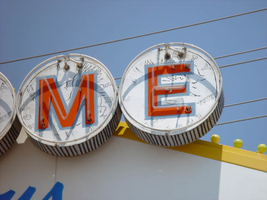
Photographs of Welcome to Fabulous Las Vegas sign, Las Vegas (Nev.), 2002
Date
Archival Collection
Description
Site name: Welcome to Las Vegas neon sign
Site address: 5200 S Las Vegas Blvd
Sign owner: YESCO
Sign details: The sign sits as a welcome to travelers entering the Las Vegas experience via Las Vegas Blvd The sign itself resides in the middle of traffic median directly in the middle of the road.
Sign condition: Structure 5 Surface 5 Lighting 5
Sign form: Pylon
Sign-specific description: The sign itself is a classic roadside pole design which faces North/South. It is double backed, internally lit with a border of yellow incandescent bulbs along the flat edge of its width. Across the top of the sign seven white neon circles house separate red neon letters which form the word welcome. Crowning the sign at the very peak, above the word welcome, is a seven pointed neon star comprised of orange and yellow neon. The cabinet itself is faced with translucent white plastic and treated with blue and red painted text. The South side of the sign reads with the Neon welcome word then in blue painted text "To Fabulous" in a 50's style text reminiscent of that used in the Last Frontier property, and cursive. The Words "Las Vegas" are spelled in all caps, in red block text. And below that in smaller blue text the word "Nevada" are spelled in all caps block text.
Sign - type of display: Neon; Incandescent; Backlit
Sign - media: Steel; Plastic
Sign - non-neon treatments: Graphics; Paint
Sign animation: chasing, flashing
Sign environment: The famous Welcome to Las Vegas sign sits alone at the South end of the strip and is often the very first sign a traveler encounters when entering the strip. It casts a surprisingly powerful glow over the barren median which it stands. It stands as a gateway to the extravaganza that is Las Vegas. When leaving the main drag headed south the sign has an equal effect of being a lone gateway in and out of the Strip.
Sign manufacturer: YESCO
Sign designer: Betty Willis
Sign - date of installation: 1959
Sign - thematic influences: Although it has no specific theme, it is from a specific period in Las Vegas History. It is the quintessential roadside pylon design. With an exposed steel center pole double backed marquee it is reminiscent of the common design of the roadside motor inn.
Sign - artistic significance: This sign has become perhaps the most copied icon of Las Vegas, as it was never copyrighted. It is a ubiquitous symbol of the city.
Surveyor: Joshua Cannaday
Survey - date completed: 2002
Sign keywords: Chasing; Flashing; Pylon; Neon; Incandescent; Backlit; Steel; Plastic; Paint; Graphics
Mixed Content
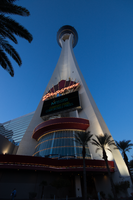
Photographs of Stratosphere signs, Las Vegas (Nev.), March 6, 2017
Date
Archival Collection
Description
Site address: 2000 S Las Vegas Blvd
Sign owner: American Casino and Entertainment Properties
Sign details: This location was the site of Bob Stupak's Vegas World that opened in 1979. The Stratosphere opening in this location in 1996, the Stratosphere includes the tallest freestanding observation tower in the United States. Developed by Bob Stupak, the Stratosphere was meant to be a landmark for the city of Las Vegas. As the years progressed, plans for restaurants and thrill rides came to fruition and the hotel now boasts several popular attractions. From 1996 to 2010, the Stratosphere went through bankruptcy, remodeling, renovations, additions, and new ownership. The current owner, American Casino and Entertainment Properties, also owns three other properties in the Las Vegas area.
Sign condition: About 4-5, appears to have relatively low damage, if any
Sign form: Porte cochere near main entrance
Sign-specific description: Stratopshere in orange neon, three vertical, squiggly lines (red, blue) pointing up toward triangular shape; second neon sign on right side of front facade, "Stratopshere" in orange, overlaid on top of blue cloud shape and orange, poles
Sign - type of display: Neon and plastic back lit sign
Sign - media: Steel and Electronic Media Screen
Sign - non-neon treatments: Electronic Media Screen and plastic back lit sign
Sign animation: Flashing for the design behind their logo on their sign
Sign environment: Located on the North end of the strip on Sahara, just across the street from the SLS Casino.
Sign architect of record: Skidmore, Owings, and Merrill
Sign - date of installation: Circa 1996 around opening
Sign - date of redesign/move: Around 2014/15 the background colors of the sign switched from a blue sky color to a pink/purple design.
Sign - thematic influences: Design similar to radio transmission towers; Stupak compared his design to Eiffel Tower and Space Needle (Seattle).
Survey - research locations: Stratosphere website http://www.stratospherehotel.com/?&mkwid=s0JHs4Hf3_dc&pcrid=102775265532&pkw=stratosphere%20las%20vegas&pmt=p&gclid=CjwKCAjwhOvPBRBxEiwAx2nhLp_Mtg7n6c-FUkbwYgY8MD3TJzgUWEp4WX1IgzePUlk1y-Rat_wmexoCJs8QAvD_BwE, recorder's office, Assessor's page
Survey - research notes: The top of the Stratosphere has blinking lights, but it is not confirmed if they are LED or Neon.
Surveyor: Carlyle Constantino
Survey - date completed: 2017-07-12
Sign keywords: Porte-cochère; Neon; Plastic; Steel; Flashing; Video screen; Incandescent
Mixed Content

Meeting minutes for Consolidated Student Senate, University of Nevada, Las Vegas, September 18, 2000
Date
Archival Collection
Description
Text

Meeting minutes for Consolidated Student Senate, University of Nevada, Las Vegas, April 19, 1983
Date
Archival Collection
Description
Text

Transcript of interview with Freddie Glusman by Barbara Tabach, October 29, 2015
Date
Archival Collection
Description
In this interview Glusman discusses his early memories of being raised in Vancouver, Canada and how he ended up in Las Vegas. He reflects on how he first got his start in the town and his early dealings with casinos and their owners while he was working as a carpet and drapery salesman and while working for Fabulous Magazine. Glusman explains how he started his restaurant and tells about the people he encountered while doing this that where significant to both the Jewish community and Las Vegas as a whole. He recounts stories that include such people as Meyer Lansky, Al Sachs, and Moe Dalitz.
Text

